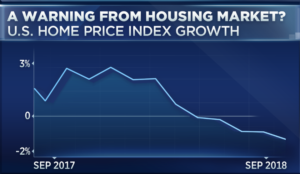Housing and The Economy: Are we already in a recession?
Fri Mar 1, 2019 by Oppenheim Law on Great Recession, Real Estate Law & South Florida Law Blog News

The Housing Bubble
A historical fact: The United States has had eleven recessions since World War II. While pessimistic economic pundits are already forecasting that we are heading towards another recession, the true issue is whether housing ever truly recovered from the last recession of 2007-2009.

Interesting, while the New York Times indicated that housing only accounts for three percent of economic output during recessions and about twice that during booms, the fact is that housing and real estate in general effects the entire economy.
How? Think about what we all buy. Cars, furniture, appliances, and other consumer goods are directly connected to the real estate market because most of us typically buy those things when we purchase a home. Then, think of all the services that we use when we buy real estate. Construction, real estate agents, mortgage brokers, architects, interior decorators, electricians, landscapers, title companies, real estate attorneys and all the other service professionals that are tied to the housing market. When real estate is slumping, all these folks are affected which plays a part in dragging down the economy. In fact, a recent report from the Federal Reserve Bank of St. Louis found that the construction sector accounted for more than a third of the decline in output during the 2007-2009 recession, and about half of the job losses which includes construction workers and those connected to the construction industry.
The question is …What is the housing and real estate market look like now? And, will the housing bubble burst?

Courtesy CNBC
Escalating Home Prices: A recipe for disaster for some and a spending frenzy for others?
According to the National Association of Realtors, existing home sales were down about 10% in December from a year earlier. While interest rates have lowered at the beginning of this year, some of the demand for housing has come back. But, homes are still sitting on the market longer, price reductions are happening, and some home builders have had layoffs. While rising interest rates and lack of supply are partly to blame, the real issue is that home prices have increased and outpaced the rise of incomes.
This means that prices have increased so quickly that markets that may have once been considered affordable are not now within reach. According to Forbes, more than one million Americans will be priced out of the housing market this year.
Yet, rising home prices help the economy by making people feel “richer” and building up home equity that owners can tap and spend elsewhere. However, increased spending from these homeowners still does not account for the overall pace of home sales and the myriad of people who are affected by the volume (or lack thereof) of construction.
Home buying is getting weaker, even though we have an ever-increasing population. While total housing starts grew at an annual rate of 1.2 million a year in January, it is still well below an average of 1.5 million from 1990 to the start of the housing bust in 2008.
Bottom line is that builders can not build homes at the prices that people want them, so construction has slowed considerably. The largest demand for housing is at the cheaper end of the market which is the hardest to serve profitably, especially as builders are faced with higher labor costs in a tight job market, and creeping interest rates. As a result, the housing sector accounted for only 3.9 percent of the economy, dragging down the overall economic output for the past three quarters.
What does this all mean? Housing is already in a recession, and really never fully recovered from the last bust. While it may not improve quickly, it probably will become as bad as it was 10 years ago.
From the trenches,
Roy D. Oppenheim


Leave a Reply